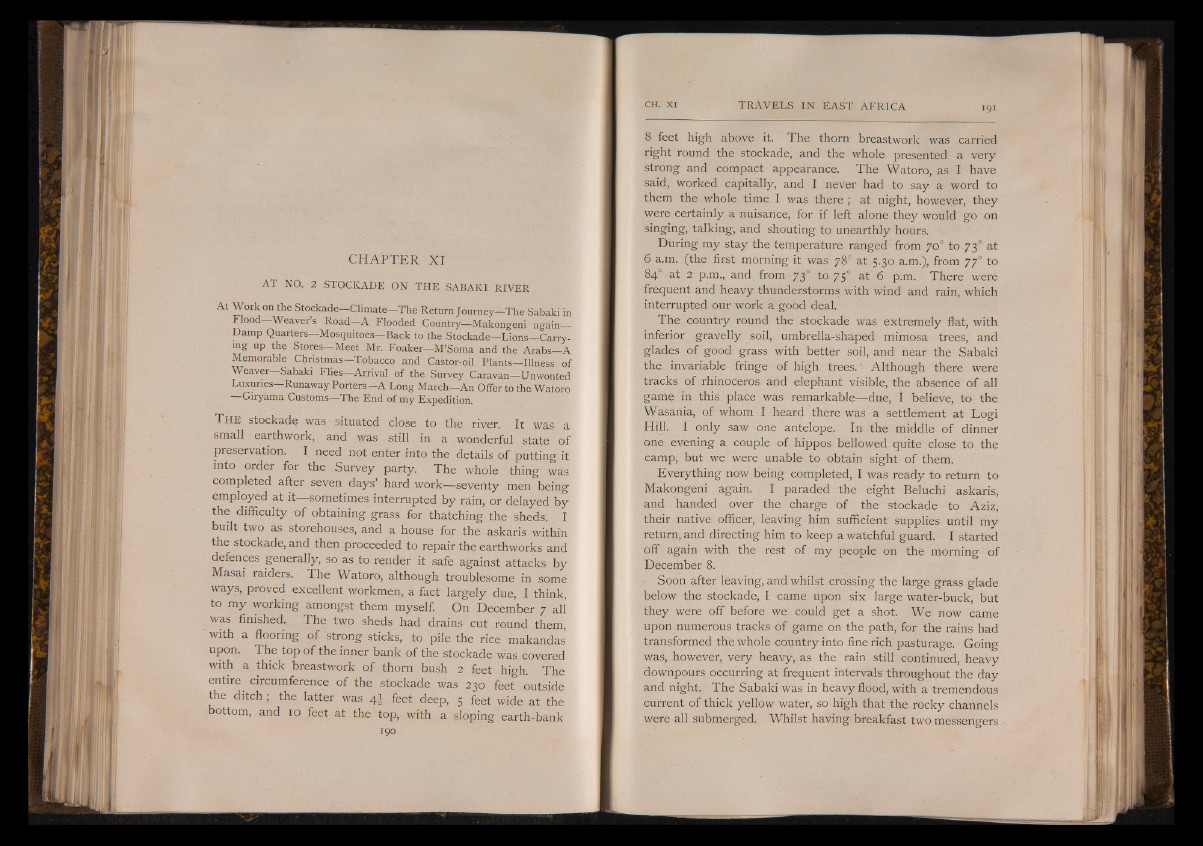
CH A P T ER XI
AT NO. 2 STOCKADE ON THE SABAICI RIVER
At Work on the Stockade— Climate— The Return Journey-The Sabaki in
Flood Weavers Road—A Flooded Country— Makongeni again—
Damp Quarters— Mosquitoes— Back to the Stockade— Lions— Carrying
up the Stores— Meet Mr. Foaker— M’Soma and the Arabs— A
Memorable Christmas—Tobacco and Castor-oil Plants— Illness of
Weaver Sabaki Flies— Arrival of the Survey Caravan— Unwonted
Luxuries— Runaway Porters—A Long March— An Offer to the Watoro
— Giryama Customs— The End of my Expedition.
T he stockade was situated close to the river. It was a
small earthwork, and was still in a wonderful state of
preservation. I need not enter into the details of putting it
into order for the Survey party. The whole thing was
completed after seven days’ hard work— seventy men being
employed at it— sometimes interrupted by rain, or delayed by
the difficulty o f obtaining grass for thatching the sheds. I
built two as- storehouses, and a house for the askaris within
the stockade, and then proceeded to repair the earthworks and
defences generally, so as to render it safe against attacks by
Masai raiders. The Watoro, although troublesome in some
ways, proved excellent workmen, a fact largely due, I think,
to my working amongst them myself. On December 7 all
was finished. The two sheds had drains cut round them
with a flooring of strong sticks, to pile the rice makandas
upon. The top of the inner bank of the stockade was covered
with a thick breastwork of thorn bush 2. feet high. The
entire circumference of the stockade was 230 feet outside
the ditch; the latter was 4A feet deep, 5 feet wide at the
bottom, and 10 feet at the top, with a sloping earth-bank
190
8 feet high above it. The thorn breastwork was carried
right round the stockade, and the whole, presented a very
strong and compact appearance. The Watoro, as I have
said, worked capitally, and I never had to say a word to
them the whole time I was there ; at night, however, they
were certainly a nuisance, for if left alone they would go on
singing, talking, and shouting to unearthly hours.
During my stay the temperature ranged from 70° to 73° at
6 a.m. (the first morning it was 78° at 5.30 a.m.), from 770 to
84°-at 2 p.m., and from 73° to 75° at 6 p.m. There were
frequent and heavy thunderstorms with wind and rain, which
interrupted our work a good deal.
The country round the stockade was extremely flat, with
inferior gravelly soil, umbrella-shaped mimosa trees, and
glades of good grass with better soil, and near the Sabaki
the invariable fringe of high trees.' Although there were
tracks of rhinoceros and elephant visible, the absence of all
game in this place was remarkable— due, I believe, to the
Wasania, of whom I heard there was a settlement at Logi
Hill. I only saw one antelope. In the middle of dinner
one evening a couple of hippos bellowed quite close to the
camp, but we were unable to obtain sight of them.
Everything now being completed, I was ready to return to
Makongeni again. I paraded the eight Beluchi askaris,
and handed over the charge of the stockade to Aziz,
their native officer, leaving him sufficient supplies until my
return, and directing him to keep a watchful guard. I started
off again with the rest of my people on the morning of
December 8.
Soon after leaving, and whilst crossing the large grass glade
below the stockade, I came upon six large water-buck, but
they were off before we could get a shot. We now came
upon numerous tracks of game on the path, for the rains had
transformed the whole country into fine rich pasturage. Goin«
was, however, very heavy, as the rain still continued, heavy
downpours occurring at frequent intervals throughout the day
and night. The Sabaki was in heavy flood, with a tremendous
current of thick yellow water, so high that the rocky channels
were all submerged. Whilst having breakfast two messengers